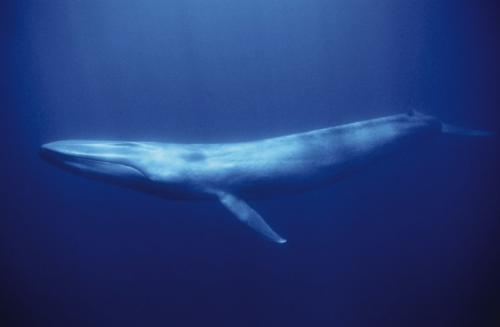Blue whales are the largest animals on Earth, weighing up to 200 tons and reaching lengths of over 100 feet. Despite their massive size, these majestic creatures are endangered due to hunting and human activity. Because of this, some people have wondered if it would be possible to keep blue whales in captivity, such as in an aquarium. While it may seem like a fascinating idea, the question remains: can blue whales survive in an aquarium?
In this article, we will explore the challenges and ethical considerations of keeping blue whales in captivity, as well as the physical and logistical requirements of maintaining an aquarium large enough to support such a massive creature. We will examine the history of whale captivity and the current state of the industry, as well as the potential benefits and drawbacks of keeping blue whales in captivity. Join us as we delve into this controversial topic and consider the fate of one of the world’s most magnificent creatures.
No, Blue Whales cannot survive in an aquarium. Blue Whales are the largest animals on earth and require a vast amount of space to swim and feed. They can grow up to 100 feet in length and weigh up to 200 tons. It is impossible to recreate their natural habitat in an aquarium, and attempting to do so would be cruel and unethical. It is important to protect these magnificent creatures in their natural habitat instead.

Can Blue Whales Survive in an Aquarium?
Blue whales are the largest animals on Earth, and they are beloved by many people around the world. But can they survive in an aquarium? This is a question that has been asked by many people, and the answer is not as simple as a yes or no. In this article, we will explore the factors that determine whether blue whales can survive in an aquarium.
The Physiology of Blue Whales
Blue whales are massive creatures that can grow up to 100 feet long and weigh up to 200 tons. They are also deep divers and can dive as deep as 1,500 feet. Their physiology is adapted to survive in the open ocean, where they have access to an almost unlimited supply of food and space. In contrast, an aquarium is a confined space with limited food and resources.
The size of an aquarium required to house a blue whale is simply not feasible. Furthermore, blue whales feed on krill, which is not readily available in captivity. Even if enough krill could be obtained, it would be difficult to provide the necessary amount of food to sustain a blue whale. In addition, the water temperature and chemistry required to maintain a healthy blue whale are difficult to achieve in an aquarium.
The Psychological Needs of Blue Whales
In addition to their physical needs, blue whales have psychological needs that must be met to ensure their survival. Blue whales are social animals that travel in pods and communicate with each other through vocalizations. In an aquarium, they would be isolated and unable to interact with other blue whales.
The stress of captivity can also cause health problems for blue whales. Studies have shown that captive whales have a higher incidence of illness and mortality than their wild counterparts. This is likely due to the stress of captivity, which can weaken their immune systems and make them more susceptible to disease.
The Benefits of Blue Whale Conservation
While it may be tempting to house blue whales in aquariums for entertainment purposes, there are many benefits to conserving these magnificent creatures in the wild. Blue whales play an important role in the ocean ecosystem and are essential to the food chain. They also have an important cultural significance and are a symbol of the natural world.
By conserving blue whales and their habitat, we can help to protect the health of the ocean and the planet as a whole. This can be achieved through efforts such as reducing pollution and protecting their feeding and breeding grounds.
Conclusion
In conclusion, blue whales cannot survive in an aquarium due to their physical and psychological needs. While it may be tempting to keep these magnificent creatures in captivity, the benefits of conserving them in the wild far outweigh the benefits of captivity. By working to protect blue whales and their habitat, we can ensure that future generations will be able to experience the wonder and beauty of these incredible animals.
| Pros | Cons |
|---|---|
| Provides entertainment for people | Blue whales cannot survive in an aquarium |
| Can promote conservation efforts | Can cause stress and illness in captive whales |
| Difficult to provide necessary food and resources in captivity |
- Blue whales are the largest animals on Earth
- They are deep divers and can dive as deep as 1,500 feet
- Blue whales feed on krill, which is not readily available in captivity
- Captive whales have a higher incidence of illness and mortality than their wild counterparts
- Blue whales are social animals that travel in pods and communicate with each other through vocalizations
Frequently Asked Questions
Blue whales are the largest animals on Earth and are known for their impressive size. Due to their size, many people wonder if they can survive in an aquarium. Here are some commonly asked questions about blue whales in captivity.
Can Blue Whales Survive in an Aquarium?
Unfortunately, blue whales cannot survive in an aquarium. These massive creatures need a lot of space to swim and thrive, and even the largest aquariums are not large enough to accommodate their needs. In addition, blue whales feed on tiny shrimp-like animals called krill, which cannot be adequately provided in an aquarium setting.
Furthermore, blue whales are migratory animals that travel thousands of miles each year, and being confined to an aquarium would cause them immense stress and harm their physical and mental health. Therefore, it is not ethical or feasible to keep blue whales in captivity.
Why Can’t Blue Whales Survive in an Aquarium?
As mentioned earlier, blue whales require a vast amount of space to swim and move around. They are used to swimming in the open ocean and traveling long distances, and being confined to an aquarium would be akin to being trapped in a bathtub. In addition, blue whales require a constant supply of krill to sustain themselves, which cannot be provided in an aquarium setting.
Furthermore, blue whales are social animals that live in large groups called pods. Being confined to a small space in an aquarium would cause them immense stress and harm their social bonds. Therefore, it is not possible for blue whales to survive in an aquarium, and it is not ethical to keep them in captivity for human entertainment.
Have Blue Whales Ever Been Kept in an Aquarium?
Blue whales have never been successfully kept in an aquarium. While some attempts have been made to capture and keep blue whales in captivity, none of them have survived for long. In fact, most of the blue whales that were captured for aquariums died within a few days or weeks of being captured due to the stress and trauma of being taken from the wild.
Therefore, it is not ethical or feasible to keep blue whales in captivity, and efforts should be focused on protecting them in the wild and preserving their natural habitats.
What Can We Do to Help Blue Whales?
There are several things we can do to help protect blue whales and their habitats. One of the most important things is to support conservation efforts and organizations that work to protect these magnificent creatures. We can also reduce our carbon footprint by using renewable energy sources and reducing our use of single-use plastics, which can harm marine life.
In addition, we can be responsible tourists and avoid activities that may harm blue whales or their habitats, such as whale watching tours that disturb their natural behavior. By taking these steps, we can help ensure that blue whales continue to thrive in the wild and remain a symbol of the beauty and diversity of our planet.
Are There Any Alternatives to Keeping Blue Whales in an Aquarium?
There are no viable alternatives to keeping blue whales in an aquarium. While some aquariums may display models or replicas of blue whales, these are not the same as the real thing and cannot provide the same educational or entertainment value.
Therefore, it is important to focus on protecting blue whales in the wild and preserving their natural habitats, rather than trying to bring them into captivity for human entertainment.

Acclimating Beluga Whales Into Georgia Aquarium | The Aquarium
In conclusion, the question of whether blue whales can survive in an aquarium is a complex one. While it may be possible to create an environment that could sustain a blue whale, doing so would require tremendous resources, both in terms of space and money. Additionally, the ethical considerations of keeping such a majestic creature in captivity should not be overlooked.
Ultimately, the best way to protect and preserve blue whales is to focus on conservation efforts in their natural habitats. By working to reduce pollution, prevent hunting, and protect critical feeding and breeding grounds, we can ensure that blue whales continue to thrive in the wild for generations to come.
In conclusion, the idea of keeping a blue whale in an aquarium may seem appealing, but it is not a feasible or ethical solution. By prioritizing conservation efforts and protecting their natural habitats, we can continue to appreciate these magnificent creatures without putting them at risk. Let us work together to ensure that blue whales remain a symbol of the beauty and wonder of the natural world.
